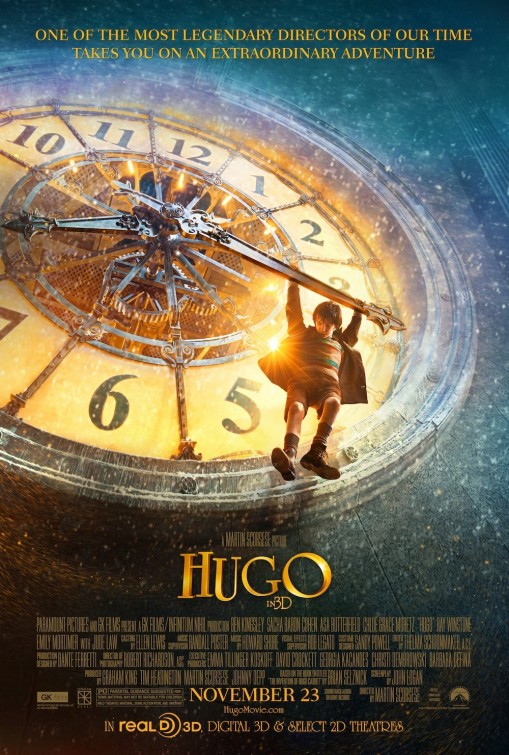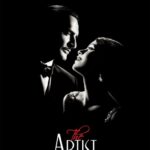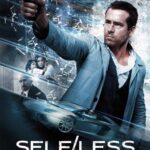Unlock The Secret
Director
Martin Scorsese
Starring
Asa Butterfield
Chloe Grace Moretz
Ben Kingsley
Sacha Baron Cohen
The story opens to late 20’s/early 30’s Paris, detailing the busy workings of a train station. The flower vendor restocks her stall, the bookseller stands watch, the artist admires the café owner and the inspector patrols the platforms, all under the watchful eye of a young boy occupying the various corridors hidden behind the walls and clock-faces. We quickly learn that the young boy is our eponymous hero and after the death of his father, was put to work in the station, attending to the grand clocks. In addition to maintaining the time-pieces and scrounging for food, Hugo’s [Butterfield] main preoccupation is finishing his father’s work, repairing an automaton – a mechanical humanoid device which should write once it is completed. Hugo’s main source for spare parts is a clockwork toy booth within the station, operated by a cantankerous old man [Kingsley]. Eventually catching the boy red handed, the old man confiscates his belongings, including a notebook which details the automaton’s required parts. Clearly disturbed by the notebook, the old man insists Hugo work in his stall until he pays off the debt of stolen goods. Refusing to tell the old man where he acquired the book, the toy vendor explains he will burn it on his return home. Venturing out into the cold, Hugo follows the old man to his house and signals a young girl inside. The precocious young lady, Isabelle [Moretz] is in fact the old man’s goddaughter, explaining his name is Georges Melies and she has lived with him and his wife since the death of her parents. The two children start a tentative friendship, as she shares her passion for books and he, his love for film. After about an hour or so of mild peril and adventure, the film’s story really kicks into high-gear, revealing the toy vendor is in fact Hugo’s late father’s favourite director. This comes as a great surprise to Hugo, Isabelle and a professor of film, who has developed an obsession for Melies’ work, most of which is lost.
In all honesty, the trailers for Hugo have been horribly misleading. Focusing on the automaton robot and a boy in a train station, I had no idea Hugo was actually about Georges Melies, so much so that when he’s finally introduced, I muttered, “They named him after the director? That’s a nice touch.” As such, Hugo is less about a boy searching for a key to activate a mechanical boy and actually a profoundly touching story about belonging and purpose. Curiously, it’s a subject many aging directors have been exploring of late: will people remember my work when I’m gone? The most recent example I can think of is Terry Gilliam’s The Imaginarium Of Dr. Parnassus, which centred on the morose statement: nobody’s interested in my stories anymore. Either way, Scorsese has always been type-cast as ‘that gangster film guy’ which is a great pity as only half of his work has really been about gangland culture and his real talent lies in evocative story-telling, making him the perfect artist to helm this beautiful, charming love-letter to the art of film-making.
But I digress. Technically speaking, the film is a wonder, flawlessly capturing 20s Paris with a hint of whimsy and romanticism, whilst retaining the lingering effects of the war. The direction is as sharp as ever, as is the stellar cinematography. Unfortunately, the editing feels a little disconnected at times, stuttering with mild continuity errors but it’s hardly noticeable unless you’re really looking for it. Howard Shore’s score, while not completely memorable is very fitting and delightfully utilised to ensure even the most perilous of situations feels like light-hearted family entertainment, rather than life-threateningly dramatic and over-the-top danger. I refuse to discuss 3D in films, despite the acclaim other industry professionals are affording it because I genuinely do not enjoy 3D and don’t feel it adds a great deal to the immersive experience. So… pfffft.
The acting is thoroughly commendable, with Ben Kingsley sliding from heartless old man to forlorn artist to jester masterfully and all the supports work in succinct harmony. However, the biggest pitfall Hugo seems to stumble on is the casting. I’m not suggesting that anyone failed in any way, as even the most minor role was played gracefully, more they were each surpassed by their co-stars. In other words, the supporting cast were just that and the heart of the film truly belongs to Butterfield, Kingsley and Helen McCroy as Georges’ wife. My biggest problem was actually with Chloe Grace Moretz’s character; something about her just felt unexplored and a tad two-dimensional. I appreciate she was a fan of literature and hungry for exploration and adventure (sometimes over common sense) but the story never delves any deeper than that. I’m not sure if this is a problem translated from the book or something was missing but it was a shame. Outside of that, for someone so young, her British accent was very convincing… even if the story was based in France.
In addition to the compelling story, sublime acting and visual treats, there are many subtle references and nods to silent film cinema and images of the time, including a Harold Lloyd-esque clock hanging sequence, the inspector’s affections for the flower-girl and even a dream sequence which references the 1895 derailment at Montparnasse station. Along with several centennial anniversaries, The Fall and the upcoming release of The Artist, there has been a subtle fascination with the silent film era. Not that this is something negative, I’m a fan of silent films and Scorsese deserves exalted praise for introducing a new generation of children to the spectacle of classic cinema. Having said all that, something vexes me. I have concerns that the rave reviews from critics may not solely be down to the fact that this is spectacular, wholesome, family fun but down to its celebration of early cinema. I realise critics claim to produce unbiased opinions but I can’t help wondering if we love it for the subject matter and that the movie will fail to really find an audience. I suppose time will tell.
Release Date:
2nd December 2011
The Scene To Look Out For:
Without a doubt, my favourite scene takes place in the library of the academy of film. As the two leads leaf through Professor Tabard’s [Michael Stuhlbarg] book on the history of cinema, the audience is bombarded by an intoxicating medley of footage from several key moments in the progression of silent film. Not only is it a wondrous montage (two words which I rarely pair together), it’s also a key turning point in the film and the introduction point for Stuhlbarg’s character – a nice surprise after his phenomenal performance in A Serious Man.
Notable Characters:
To hold your own amongst such acclaimed talent is a very difficult thing but no matter how well you perform, you will still be up against people like Ben Kingsley. Kingsley’s had a fair share of dire performances in less than promotable films (FUCKING THUNDERBIRDS FOR GOD’S SAKE!) but when he’s on form, he’s a master all unto himself. As stated before, the range of passion and heartbreak the man channels for Melies’ forgotten place in cinema is astonishing, chilling and at times, deeply moving.
Highlighted Quote:
“Have you ever wondered where your dreams come from? This is where they’re made”
In A Few Words:
“Exquisite, passionate and thoroughly engrossing story-telling from a director at the peak of his creativity”
Total Score: 5/5
![The Red Right Hand Movie Reviews [Matthew Stogdon]](https://reviews.theredrighthand.co.uk/wp-content/uploads/2021/12/cropped-header1.png)




